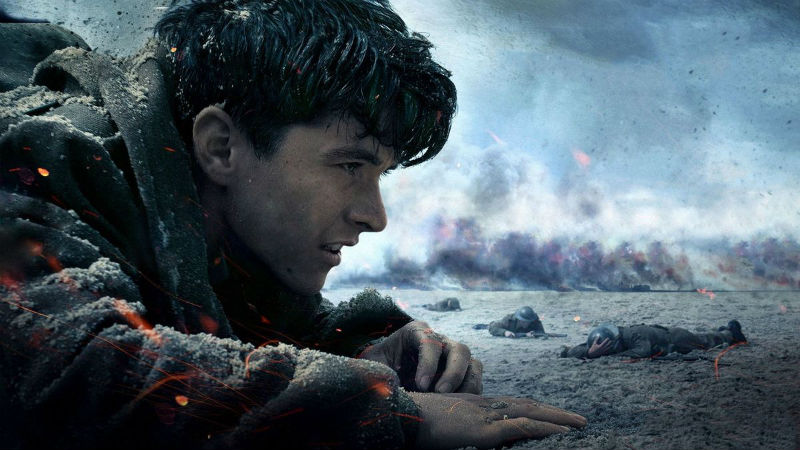Among other things, arthouse cinema celebrates experimentation, a quality demonstrated by Memento (Christopher Nolan, 2000), a thriller that tells its mystery in reverse chronological order. Conversely, blockbusters mainly aim to appeal to mass audiences through sheer entertainment. These two avenues seem contradictory, but the strength of the British director’s early work lies in its ability to combine them and thereby cater equally to hardcore cinephiles and the average movie-goer. With Inception (2010) being his best example to date, Nolan’s films focus on story, character and big-budget thrills in equal measure. Nolan trusts the intelligence of his audience.
Denis Villeneuve’s (pictured above; image by Gage Skidmore) Arrival (2016) mirrors Nolan’s Inception and Interstellar (2014) in its use of time, and Blade Runner 2049 (Villeneuve, 2017) is both intellectual and visually stunning. The Canadian helmer’s early work is similarly comparable to Nolan’s – like Memento before it, Enemy (2013) is an internal thriller centred on a psychologically unbalanced protagonist. Having started from similarly independent backgrounds, both directors have maintained the abstractions of their earlier filmography in their bigger-budget work.
Nolan and Villeneuve both excite viscerally. They have championed the experience of going to the cinema over streaming, openly criticising their studios in the process (Nolan has parted ways with long-term collaborators Warner Bros). Both favour practical effects over CGI. Especially Nolan. His films have included a functioning Batmobile, high-street truck flips and plane crashes. Though not as comprehensively, Villeneuve has followed this model – whereas most blockbusters (think Marvel) revolve around green screen he shot large parts of Blade Runner 2049 and Dune (2021) in huge, intricately detailed sets (see video below) – even filming the latter in the Jordanian desert.
The Dark Knight (Nolan, 2008) introduced unforeseen nuance into the superhero genre, changing it from being generally perceived as silly fun to being taken seriously by critics and large audiences. Its omission from the 2008 Best Picture nominations influenced the Academy’s decision to include more nominees in the future. Equally, Inception boasts a complex narrative that still adheres to the demand for explosive blockbuster spectacle.
.
A recipe gone awry?
Lately though, this fusion hasn’t worked as well in Nolan’s work. Visuals and music in Tenet (2020) are superb (Ludwig Göransson deserves an apology from the Academy), but the story is far too confusing to engage with emotionally. It also seems that as Nolan’s technical ambition has escalated, striking a balance between abstraction and mass appeal has become increasingly difficult. Dunkirk (Nolan, 2017; pictured below) boasts impressive set-pieces and the “inversion” in Tenet looks stunning, but both lack a strong emotional core.
Meanwhile, Villeneuve’s latest films have succeeded where Nolan’s have failed. Blade Runner 2049 is aesthetically striking and provides a touching story, the same of which can be said for Arrival. Both boast the intelligence and awe we associate with Nolan whilst also being easier to follow.

Blade Runner 2049 and Arrival did well critically, and the early praise for Dune suggests a continuation of this trend. Meanwhile, Tenet underperformed at the US box office and received mixed reviews by Nolan’s standards. Even though The Dark Knight Rises and Interstellar performed well commercially and critically, they are both divisive. Polarisation isn’t necessarily bad, but the lack of controversy surrounding Villeneuve suggests he is developing a more winning version of Nolan’s formula.
Additionally, Nolan’s upcoming film about atom-bomb creator J. Oppenheimer seems smaller-scale than the bombastic Tenet, as suggested by its $100 million budget (relatively small for Nolan). Given the biographical subject matter, it could also find Nolan scaling back baffling storytelling in favour of something more accessible. Because of this potential shift the spotlight could now be on Villeneuve to provide art-house blockbusters for the masses.
.
Money talks
The notion of Villeneuve “replacing” Nolan is complicated by the fact that Nolan’s films still do (very) well financially. Dunkirk grossed over $527 million worldwide, whereas Blade Runner 2049 disappointed (relatively) with a $92 million US and Canada gross and $259 million international intake. Even Tenet’s relatively weak performance (a measly $58 million in the US and Canada) is difficult to judge given it was released mid-pandemic. If Villeneuve is emulating Nolan, he is doing so artistically more so than financially.
At the moment, all eyes are on Dune. At a speculated budget of $165 million, it is Villeneuve’s biggest film yet, and it shows. Each frame is enormous, and the bombastic Hans Zimmer (Nolan’s frequent collaborator, unsurprisingly) score adds extra scope. Dune is intellectual and viscerally entertaining, centring on dreams and complex politics as well as a conventional battle against evil. It seems poised to appeal to viewers seeking thinking man’s sci-fi as well as larger audiences. It has garnered positive reviews so far and debuted strongly overseas (it harvested $36.8 million from just 24 markets in early release) – with the added star power of Timothée Chalamet and Zendaya it is likely to triumph.
With Nolan scaling things down and Dune poised to succeed commercially and critically, Villeneuve seems likely to take his mantle as Hollywood’s chief mediator of art-house and blockbuster cinema.
…
.
Dune is in cinemas on Thursday, October 21st.
You can reach Amhara Chamberlayne on Twitter @AmharaFilm.








